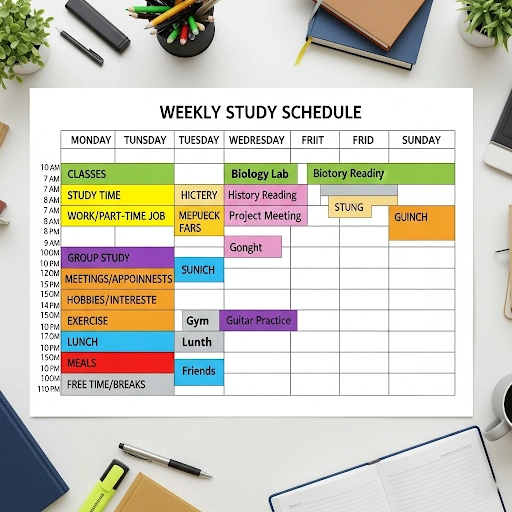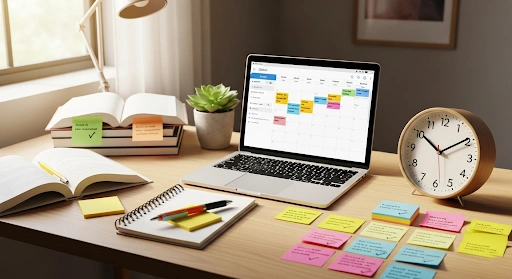Juggling classes, assignments, extracurriculars, a part-time job, and a social life can feel overwhelming for many students. Mastering time management students strategies helps you stay organized even when the clock seems to tick faster and deadlines loom larger. If you often feel stressed or struggle to keep up, effective time management for students provides practical ways to prioritize tasks and reduce pressure. By applying proven time management students techniques, you can make intentional choices that boost efficiency, improve academic results, and support personal well-being. This guide offers actionable tips and student productivity hacks specifically designed for busy students, helping you regain control of both your schedule and your life.
In today’s fast-paced educational environment, the demands on students keep increasing, making time management students an essential skill. From online courses to collaborative projects, mastering time management for students is no longer optional but crucial for success. By applying proven time management students strategies, you can prioritize tasks, minimize distractions, and create schedules that actually work. Developing effective time management techniques for students not only improves grades but also allows more time for meaningful activities. Let’s explore practical ways that help time management students turn chaos into control and make every minute count.
- What is Time Management for Students? Time Management Students
- Why Time Management Matters: Benefits for Students
- How It Works: Core Time Management Strategies
- Real-Life Use Case: Mark’s Productivity Turnaround
- Common Mistakes to Avoid in Time Management
- Expert Tips and Best Practices for Student Productivity
- FAQ Section
- Conclusion
What is Time Management for Students? Time Management Students
For students, time management students is the process of planning and consciously controlling how time is spent on specific tasks to boost effectiveness and productivity. Practicing time management for students involves organizing activities and setting priorities rather than reacting to deadlines. By applying time management strategies for students, you can allocate your hours intentionally, ensuring both academic and personal goals are met. Mastering time management students skills means taking proactive steps to balance study, work, and leisure efficiently.
Key aspects of effective time management for students include:
- Goal Setting: Defining what you want to achieve (e.g., getting an A on an exam, completing a research paper, balancing study with leisure).
- Prioritization: Identifying which tasks are most important and urgent, and tackling them first.
- Scheduling: Creating a realistic study schedule or daily plan that allocates specific time slots for tasks.
- Task Management: Breaking down large projects into smaller, manageable steps.
- Minimizing Distractions: Identifying and eliminating common time-wasters like social media, excessive TV, or unproductive multitasking.
- Self-Discipline: Sticking to your plan and resisting the urge to procrastinate.
In 2025 and beyond, time management students skills are more crucial than ever for academic and professional success. With the rise of hybrid learning models and constant digital distractions, students who prioritize time management for students will gain a clear advantage. Mastering effective strategies for time management students allows individuals to stay organized and meet deadlines confidently. Future trends highlight the importance of proactive planning, making time management students abilities indispensable for thriving in self-directed learning and project-based work.

Why Time Management Matters: Benefits for Students
Effective time management for students brings a cascade of benefits that directly improve academic performance, well-being, and future prospects. By adopting time management students strategies, learners can accomplish tasks more efficiently while reducing stress. Students who focus on practical time management techniques develop habits that make study sessions more productive and less overwhelming. Overall, mastering time management students skills ensures not just getting more done, but achieving better results with greater balance and focus.
- Improved Academic Performance: When you manage your time well, you allocate sufficient time for studying, assignments, and revisions. This leads to deeper understanding, higher quality work, and ultimately, better grades. You’ll avoid last-minute cramming and submit well-thought-out assignments.
- Reduced Stress and Anxiety: Procrastination and disorganization are major sources of student stress. By planning ahead and ticking off tasks systematically, you reduce the feeling of being overwhelmed, leading to a calmer and more focused mindset.
- Increased Productivity and Efficiency: Knowing what needs to be done and when, allows you to work smarter, not just harder. You’ll complete tasks more quickly and with better results, boosting your overall student productivity.
- More Free Time and Better Work-Life Balance: Counterintuitively, effective time management often creates *more* free time. By efficiently completing academic tasks, you open up opportunities for hobbies, social activities, exercise, and rest, leading to a healthier balance.
- Enhanced Quality of Work: When you’re not rushing, you can dedicate more thought, effort, and attention to detail for each task. This directly translates into higher quality assignments, better prepared presentations, and more thorough research.
- Development of Essential Life Skills: Time management is a foundational skill transferable to nearly every aspect of adult life, from career responsibilities to personal projects and financial planning. Mastering it now sets you up for long-term success. For more insights on foundational skills that lead to success, including organizational approaches that can be applied to complex projects, you might find this article on agile scrum certification helpful: https://manukliar.com/agile-scrum-certification-tips-beginners/.
How It Works: Core Time Management Strategies
Effective time management is built upon a combination of planning, prioritization, and disciplined execution. Here are the core strategies that can transform your student life:
1. Set Clear Goals and Break Them Down
- SMART Goals: Ensure your goals are Specific, Measurable, Achievable, Relevant, and Time-bound. Instead of “study more,” aim for “study Chapter 3 of Chemistry for 2 hours on Monday evening.”
- Task Decomposition: Large tasks (like a research paper) can feel overwhelming. Break them into smaller, manageable sub-tasks (e.g., “choose topic,” “research sources,” “create outline,” “write introduction”). This makes the task less daunting and easier to start.
2. Prioritize Effectively (The Eisenhower Matrix)
- Urgent vs. Important: Not all tasks are created equal. The Eisenhower Matrix helps you categorize tasks:
- Urgent & Important (Do First): Deadlines, crises.
- Important, Not Urgent (Schedule): Planning, relationship building, preventative measures. This is where most of your student productivity lies.
- Urgent, Not Important (Delegate/Minimize): Interruptions, some emails.
- Not Urgent, Not Important (Eliminate): Time-wasters, excessive leisure.
- “Eat the Frog” (Tackle the Hardest First): Begin your day with your most challenging or least appealing task. Once it’s done, the rest of your day feels lighter, and you build momentum.
3. Create a Realistic Study Schedule
- Use a Planner/Calendar: Whether digital (Google Calendar, Notion) or physical, visually block out your classes, appointments, study blocks, and free time. Be realistic about how long tasks actually take.
- Schedule Breaks: Your brain needs rest. Incorporate short breaks (e.g., 5-10 minutes every hour) and longer breaks (30-60 minutes) into your study schedule. The Pomodoro Technique (25 minutes work, 5 minutes break) is a popular method.
- Batch Similar Tasks: Group similar activities together (e.g., answering all emails at once, doing all laundry at once). This reduces context switching and saves time.
4. Minimize Distractions and Optimize Your Environment
- Digital Detox: Put your phone on silent, turn off social media notifications, or use website blockers during study sessions. Consider dedicated “deep work” periods where you are completely unplugged.
- Designate a Study Zone: Create a consistent, quiet, and organized space specifically for studying. This trains your brain to associate that environment with focused work.
- Inform Others: Let family or roommates know your study schedule so they can minimize interruptions during your focused work blocks.
5. Review and Adapt Regularly
- Weekly Review: At the end of each week, review what worked and what didn’t in your schedule. Adjust your plan for the upcoming week based on your experiences.
- Be Flexible: Life happens. Don’t let a missed deadline or an unexpected event derail your entire plan. Adapt, readjust, and get back on track.

Real-Life Use Case: Mark’s Productivity Turnaround
Mark, a college junior, was a classic “busy student” juggling multiple responsibilities. As an engineering major who played intramural soccer, volunteered weekly, and worked a part-time job, he often struggled to keep up. His grades were slipping, he felt constantly tired, and deadlines seemed impossible to meet. Recognizing the need for better time management students strategies, Mark began exploring practical time management students techniques to regain control. By focusing on proven time management students approaches, he aimed to boost productivity and reduce stress. With consistent application of time management students skills, he gradually turned his hectic schedule into a manageable and organized routine.
Mark started by implementing a weekly planning session every Sunday evening, a key practice in effective time management students routines. He used a digital calendar to log all his fixed commitments, from classes to work shifts and soccer practice, applying practical time management students techniques. Next, he reviewed his assignments for the week, breaking down large projects like lab reports into manageable steps a strategy central to strong time management students habits. To stay focused, he scheduled dedicated “deep work” blocks for each task rather than vague study periods, refining his overall time management students approach and creating a clear, organized study schedule.
Next, Mark focused on prioritization skills. Instead of tackling whatever felt easiest, he used a variation of the Eisenhower Matrix, identifying his “urgent and important” tasks (e.g., a paper due Tuesday, an upcoming exam) and scheduling them first. His “important but not urgent” tasks (like reviewing lecture notes daily or reading ahead in a textbook) were also given dedicated slots, ensuring he wasn’t always reacting to crises. He realized that previously, “urgent, not important” tasks (like answering every text immediately) often derailed his focus.
To combat distractions, Mark implemented a “study mode” for his phone, turning off all non-essential notifications and using a website blocker for social media during his study blocks. He found a quiet corner in the campus library that became his dedicated study zone. He even communicated his study times to his roommates, asking for minimal interruptions.
A key strategy for Mark was incorporating planned breaks. He used the Pomodoro Technique: 25 minutes of focused work, followed by a 5-minute break. After four Pomodoros, he took a longer 30-minute break. This helped him maintain focus and prevent burnout, significantly boosting his student productivity during study sessions.
Within a month, Mark noticed a dramatic change. He was completing assignments on time, felt less stressed, and even had more free time for himself. His grades began to improve, and he felt a renewed sense of control. Mark’s story illustrates that even the busiest students can significantly improve their academic and personal lives by adopting effective time management strategies and consistently applying them.

Common Mistakes to Avoid in Time Management
While good intentions are a start, many students fall into common traps that undermine their time management efforts. Being aware of these pitfalls is the first step to avoiding them:
- Over-scheduling and Unrealistic Expectations: Trying to pack too many tasks into one day or hour leads to burnout and a feeling of failure. Be realistic about how long tasks take and include buffer time.
- Ignoring Breaks: Pushing through without breaks actually decreases focus and efficiency. Your brain needs time to rest and consolidate information.
- Multitasking: While it might feel productive, true multitasking (doing two cognitively demanding tasks simultaneously) is largely a myth. It leads to fragmented attention, more errors, and takes longer overall. Focus on one task at a time.
- Procrastination: Putting off tasks, especially difficult or unpleasant ones, creates a backlog and increases stress. Break down daunting tasks and start with the hardest part.
- Not Prioritizing: Treating all tasks equally means important assignments might get pushed aside for less crucial activities. Learn to identify and tackle your most important work first.
- Lack of a Centralized System: Juggling assignments, appointments, and deadlines in your head or across multiple scattered notes leads to forgotten tasks and disorganization. Use one consistent planner or digital tool.
- Underestimating Task Time: Many students are overly optimistic about how quickly they can complete something. Always add a buffer to your time estimates.
- Getting Sidetracked by Distractions: Allowing social media, non-academic browsing, or constant notifications to pull you away from focused work. Proactively minimize these distractions.
- Lack of Review and Adjustment: Sticking to a rigid plan without reviewing its effectiveness or adapting to changes in your schedule is a recipe for frustration. Regularly assess and adjust your approach.
Expert Tips and Best Practices for Student Productivity
Beyond the core strategies, incorporating these expert college tips and best practices can further amplify your student productivity and make time management a natural part of your routine:
- Understand Your Peak Productivity Hours: Are you a morning person or a night owl? Schedule your most demanding tasks during the times of day when you have the most energy and focus. “Knowing when your brain is most ‘on’ is a superpower,” says Dr. Anya Sharma, a productivity consultant.
- Use Technology Wisely: Productivity apps (e.g., Todoist, Trello), note-taking tools (Evernote, Notion), and calendar apps can be powerful allies. Experiment to find what works for you, but remember the tool is only as good as your consistency.
- Learn to Say No: It’s okay to decline commitments that don’t align with your priorities or overextend your schedule. Protecting your time is a crucial time management skill.
- Implement a “Shutdown Routine”: At the end of your study day, take 10-15 minutes to organize your workspace, review your accomplishments, and plan for the next day. This signals to your brain that it’s time to switch off and prevents tasks from lingering in your mind.
- Batch Smaller Tasks: Respond to all emails at a specific time, make all your phone calls at once, or run all errands together. This reduces context switching and saves time.
- Practice Self-Compassion: You won’t always stick to your plan perfectly. Don’t beat yourself up for deviations. Acknowledge what went wrong, adjust, and move forward. Consistency over perfection.
- Leverage “Wait Time”: Use small pockets of unexpected free time (e.g., waiting for class to start, on public transport) for quick tasks like reviewing notes, responding to a short email, or brainstorming ideas.
- Delegate When Possible: If you’re working on a group project, ensure tasks are distributed fairly and effectively. Learn to trust your teammates.
- Get Enough Sleep and Exercise: These are not luxuries but fundamental pillars of student productivity. A well-rested and physically active mind is more focused and efficient.
- Create a “Not-To-Do” List: Identify activities that consistently waste your time or distract you from important tasks, and commit to avoiding them during your productive hours.
FAQ Section
Q: How do I create a realistic study schedule if my workload is constantly changing?
A: Start with your fixed commitments (classes, work). Then, block out recurring study slots. For variable tasks, use a weekly planning session to populate these slots with specific assignments, breaking down large projects into smaller chunks. Be prepared to adjust your schedule daily as new tasks arise or priorities shift. Flexibility within a structured framework is key for effective planning.
Q: What’s the best way to stop procrastinating on difficult assignments?
A: Break down the difficult assignment into the smallest possible first step (e.g., “open document,” “write one sentence of introduction”). Use the “Eat the Frog” method by tackling this small, difficult step early in your day. Promise yourself a small reward upon completion. The hardest part is often just getting started.
Q: Should I use a digital planner or a physical planner for time management?
A: The best choice depends on your personal preference and learning style. Digital planners offer reminders, synchronization across devices, and easy editing. Physical planners provide a tangible sense of accomplishment and can be less distracting. Experiment with both to see which helps you maintain consistency and focus on your study schedule.
Q: How can I deal with constant notifications and digital distractions?
A: Implement a “digital detox” during study times. Turn off non-essential notifications on your phone and computer. Consider using website blockers for social media and entertainment sites. Place your phone in another room or on silent. Communicate to friends and family that you have dedicated “focus time.” Creating a distraction-free environment is vital for boosting student productivity.
Q: Is it okay to take breaks, or should I just power through my work?
A: Taking regular breaks is not just okay, it’s crucial for sustained focus and memory retention. Studies show that short, frequent breaks (like those in the Pomodoro Technique) can actually increase overall productivity and prevent burnout. Powering through often leads to diminishing returns and lower quality work. Prioritize your well-being as part of your time management strategy.
Q: How do I prioritize tasks when everything feels important?
A: Use the Eisenhower Matrix (Urgent/Important) or a similar prioritization framework. Focus on deadlines and the impact of each task. Tasks with immediate deadlines and high impact should be done first. Tasks that are important but not urgent (like long-term project planning or skill development) should be scheduled consistently. Learn to differentiate between true urgency and perceived urgency. This is a core aspect of developing strong prioritization skills.
Q: How can time management help with balancing academics and social life?
A: By efficiently managing your academic tasks, you create dedicated blocks of free time. When you know your studies are under control, you can fully enjoy your social activities without guilt or stress. Explicitly schedule leisure and social time into your planner, just as you would study time. This proactive approach ensures a healthier and more enjoyable work-life balance.
Conclusion
Time management is more than just a skill; it’s a superpower for busy students. By applying effective time management strategies for students, you can intentionally plan your day, prioritize tasks, and reduce distractions. Consistently practicing these strategies helps transform your academic journey from a stressful sprint into a controlled, productive marathon. Remember, true success isn’t about doing everything, but about focusing on the right tasks at the right time with clarity and intention.
Embrace these strategies, be patient with yourself, and commit to continuous improvement. The rewards extend far beyond better grades – you’ll gain confidence, reduce stress, and develop invaluable effective planning skills that will serve you well for a lifetime. Start today, and unlock your potential for academic excellence and a more balanced life. For further exploration into how technology and strategic planning shape future success and security, consider this article on future timelines: Thread 1.4 Timeline 2025.
To continue your journey into cloud security, consider the in-depth resources from the Cloud Security Alliance (CSA), a leading authority on cloud best practices. For practical guides, check out our posts on building a secure digital toolkit.
For additional high-authority insights on productivity and time management, explore Wired, Statista, and Google Scholar for research-backed strategies.
